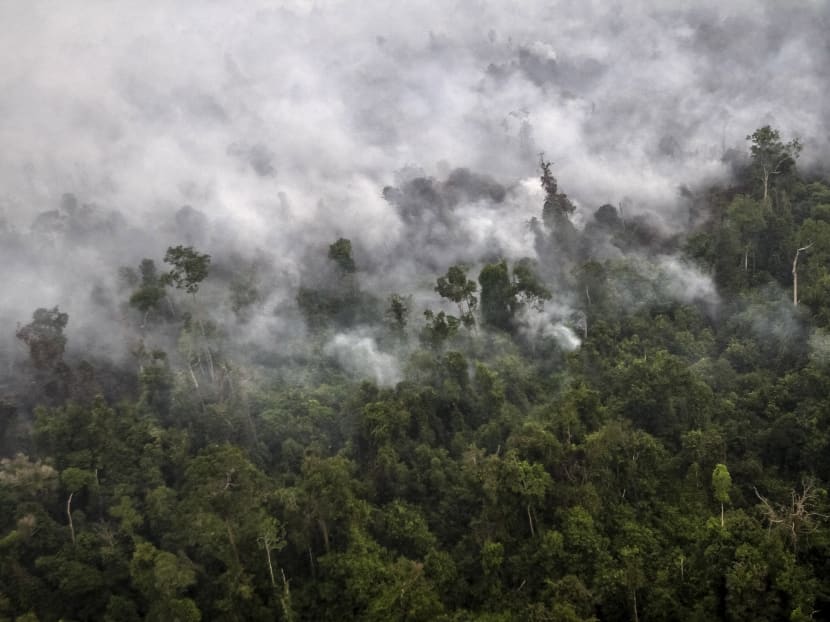Indonesia ‘morally and legally responsible for haze’
SINGAPORE — Weighing in on why there is no straightforward resolution to the haze problem, Singapore’s Ambassador-at-Large Tommy Koh today (Oct 8) pointed out the “political cost” involved, unlike trade matters that can be referred to international courts.

A forest fire is seen from a helicopter operated by the National Agency for Disaster Management (BNPB) over Langgam District, Riau province on the island of Sumatra in this September 23, 2015 file photo taken by Antara Foto. Photo: Reuters
SINGAPORE — Weighing in on why there is no straightforward resolution to the haze problem, Singapore’s Ambassador-at-Large Tommy Koh today (Oct 8) pointed out the “political cost” involved, unlike trade matters that can be referred to international courts.
Speaking at the Law Society’s biennial lecture, Professor Koh was asked by a member of the audience why more resolute measures were not taken to address the situation.
He did not elaborate on what he meant by political cost but he referred to how he had pleaded with the Government to take legal action against Australia when in 2006, it unilaterally imposed a requirement on ships passing through the Torres Strait — which lies between Papua New Guinea and Australia — to be operated by a licensed Australian pilot, unless the vessels fall under an exempted class. Prof Koh said: “But if you were the Prime Minister of Singapore… you have to think, in the totality of my interest with Australia, how much weight do I give to this one irritant?”
He added that diplomats from the United States, too, were willing to “scold the Australians but not take legal action” due to their country’s strategic and military interest. “Life is complicated, my friend,” he said.
On the haze problem, Prof Koh, who also chairs the Governing Board of the National University of Singapore’s Centre for International Law, reiterated that while every country has “a sovereign right to exploit its natural resources, this is not an unlimited right”.
“The international law is very clear... activities that happen within your jurisdiction, (when) it causes harm and damage to another country, you are responsible,” he said, adding that he was upset by “unreasonable statements” made by some Indonesian leaders. “It must be clear to everyone, including our Indonesian brothers and sisters, that they are morally and legally responsible for the haze.”
Prof Koh reiterated that the Republic can play its part to enhance environment sustainability, such as by requiring all financial institutions to join the Roundtable for Sustainable Palm Oil and working with international associations to enhance fire-fighting standards in the region.
He also commended the efforts of non-government groups such as the Singapore Environment Council and the Haze Elimination Action Team to try and tackle the problem. However, he stressed that the ball is in Indonesia’s court. “The bottom line is, the problem does not lie in our territory. We can’t solve it from here.”
Away from the haze, Prof Koh also spoke about the “constant tussle” in diplomacy between friendship and principles.
Among the examples he cited: When Singapore and its Association of South-east Asian Nations neighbours condemned Vietnam’s invasion of Cambodia in the late 1970s, many other countries applauded the Vietnamese as a “saviour” for overthrowing the Khmer Rouge. “Think about it. Should we approve of a militarily powerful neighbour using its military power to invade and occupy a neighbour and to impose a regime of its choice on the country...I was torn,” said Prof Koh, who was Singapore’s Permanent Representative to the United Nations (UN) then. He added that he had to persuade the UN to support ASEAN’s position and was “berated” by Western counterparts for being “heartless”.
Another example was when Prof Koh intervened on the Republic’s behalf in the UN Security Council’s debate on the United States’ invasion of Grenada in the 1980s. The Americans saw his action as unfriendly, he said. “Do you put friendship first? Or do you put principle first? It is a constant tussle in diplomacy, and to this day I am not sure whether I made the right judgment call. Maybe my legal training has corrupted me,” he said.
Prof Koh also explained why Singapore is slow to accede to international conventions on human rights. The Republic is relatively cautious in undertaking international obligations and it must first be satisfied that it can live up to them, he said. “Many countries take a very cavalier attitude and just sign up to everything. But it doesn’t mean they internalise and implement these obligations,” he added.
Also, Singapore takes a “collegial” attitude by seeking consensus from agencies here before assenting to any convention. But Prof Koh said this approach frustrates him, as the dissenting agencies often do not have a compelling case. “But it is our collegial culture that we do not proceed on the basis of majority… I think that is a problem. Maybe the PM can review this.”






